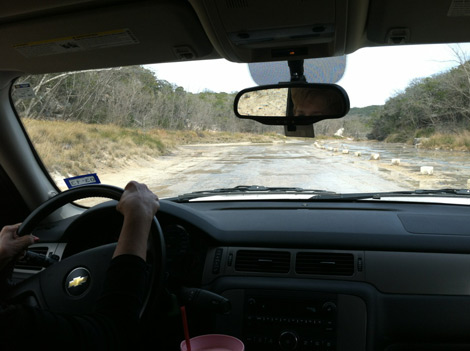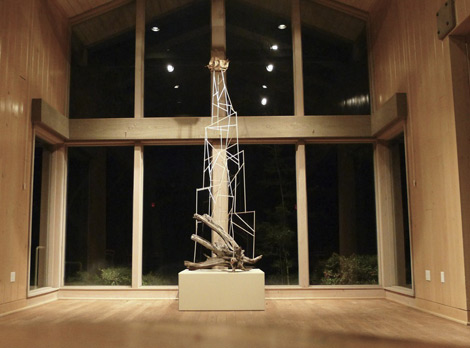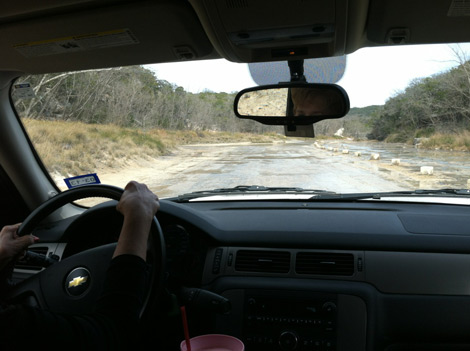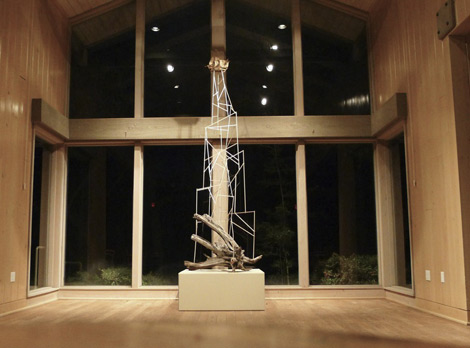If lately you have found yourself in need of a retreat, or perhaps the thought has never crossed your mind, but now, upon reflection, it sounds like a good idea, then let us tell you that there is no better spot for such an experience than Laity Lodge, a place of repose and reflection—and yet intellectual and social stimulation, too—nestled in the Texas Hill Country. Forty retreat weekends are happening there this year, and we, fortunate to be invited to be artists in residence at Laity Lodge for a few weeks, were there for two exciting ones—a conversation between pastors and artists led by James K. A. Smith and David Taylor, and, two weeks later, Seattle Pacific University's David Nienhuis' study on the Letter of James, a weekend that also featured music by Sandra McCracken and Derek Webb. We organized poetry and art workshops on those Saturday afternoons, but otherwise learned in the sessions, enjoyed the concerts, and pursued some art and writing projects of our own. Upcoming retreats will include speakers such as David Lyle Jeffrey and J. I. Packer.
The goal of all of this? Time for rest and thought, which makes possible the transformation of daily life, work, and the world. Who's it for? Regular people in the church—hence the name Laity Lodge. Eugene Peterson describes it as a place to overcome the "disabling" connotations of "laity" and "layperson" in today's church. It's a place to restore the word laos (Greek for "people") to what Peterson calls "its Gospel vigor." We recommend it highly, not only for the programming but also for the setting, which becomes a very present member of the retreat, drawing out visitors and shaping their experiences.
Laity Lodge is located in the center a group of family camps, all of which reside on 1,900 acres of the H. E. Butt Foundation Camp property. The site is two hours northwest of San Antonio, about an hour beyond Kerrville, and twelve miles north of Leakey (pronounced Lay-key.) The spring-fed Frio River runs through the canyon there. As its source and name suggest, it is invigoratingly cold! Its water is startling in its clearness when seen from close up, but a bright green for those viewing it from the deck of the lodge or atop the limestone canyon walls.

DAVID: The drive in to Laity Lodge is the first clue that you are in for a unique retreat experience. Your cell phone will cut out long before you get there (mine stopped working just past Kerrville, which is an hour away). Miles and miles of ranches follow. The only respite before you reach the camp is the Garven Store, which claims both to be the oldest convenience store in Texas and the purveyors of the finest beef, buffalo, and deer jerky in the world. When you reach the camp entrance, you begin to descend a gravel road down into the canyon. This road ends at the Frio River. Well, "ends" isn't really the right word, as the sign next to the river tells you: "Yes! You Drive In The River." I think that was really our "We're-not-in-Illinois-anymore" moment. Something about driving on a river makes you very aware of the present.
I have to confess I am often weary of retreats and conferences, particularly ones at Christian institutions. In my experience, they tend to become so overly scheduled that they feel neither restful nor spiritual. Laity Lodge bucks that trend. You can leave your watch in your room. You won't need it. No one is given a copy of the schedule. One is posted in a central location, but the fact that you do not carry a copy on you keeps it from dominating your thoughts. A bell is used to announce transitions from activity to activity. "Every other time you hear the bell, you'll eat," announced Tim Blanks, Director of Operations and uber-host, at the beginning of the first retreat.
Official conference meetings are held in "the Great Hall," a large room with plenty of comfortable seats (sofas!) and a fantastic view of the canyon and the river below. Each time we met for a conference talk, we began with worship, singing a few hymns selected and led by a musician serving as worship leader. Musicians and visual artists are part of every retreat and are seen as integral to their mission. Concerts, exhibitions, and hands-on workshops are hosted in the Cody Center, built to serve a variety of visual and performing arts. The arts are offered to guests as an avenue for creativity, contemplation, and community. "Offering" is really a key word in the way Laity Lodge operates. They have developed a remarkable way of offering space, not just place. Even at a conference, there is a sense that you have space to breathe, to let go, to "be."

BRETT: That's a great description of most visitors' surreal first experience driving on that riverbed, David. The water was at a fairly low level of our rental cars' wheels, but how it jetted upward, splashing the side mirrors, when we gained a little speed! Frederick Buechner has described how he knew he "had reached the Land of Oz" when he was instructed not to turn at the Frio River, but in the river. I found Buechner's impression in a wonderful book on the place, which I was reading during our residence: A Dream That Came to Life: The History of the Laity Lodge Retreat Center (2007), by Howard Hovde, an emeritus director of the lodge. The founders' family histories were the first details that caught my interest. One family moved from Tennessee for the sake of Texas' clean air, dry climate, and gentle winters. They landed in Kerrville, where the youngest son worked as a delivery boy. He eventually founded the H. E. Butt Grocery Company. He also married a daughter of Thomas Kirk Holdsworth, who had worked as a schoolteacher in northern England till a declining wool industry led to decreased enrollments. He sought work abroad and moved his family to scrub country near Uvalde, Texas, in 1880. The lived in tents for three years, enduring chill nights and one-hundred-degree-plus temperatures, while the transplanted schoolteacher worked as a rancher and sewing-machine salesman. Talk about a transition!
The couple was educated at Baylor and shared their big thoughts. One of his letters to her in 1924 sounds like some noble thing out of a Regency-era epistolary novel: "We must have only the highest and best thoughts," he wrote, and "May God give me strength to so live as to always deserve your faith." They formed a non-profit foundation in 1933, and in 1954 acquired the Wolfe Ranch that is the present site of Laity Lodge and other camps. Originally they hoped that one hundred children might "Experience God and the beauty of this place." In 2005, 25,000 people did, with a capacity among the various camps for 700 visitors at one time.
The Cody Center and the adjacent visual-artist studios are some of the lodge's most gorgeous stone and wood buildings, harmoniously blending into the landscape, but it has been a writer-friendly place for a long time, too. For ten years, Madeleine L'Engle spent a month there each year, and some who work at the lodge still recall her memorable presence. Eugene Peterson stunned the crowd at one retreat by sharing an early, colloquial rendering of a psalm—thus The Message was born. To this day, a literary group named the Chrysostom Society gathers at the lodge for readings and book-related conversations. The setting reflects this literary enthusiasm, with rooms in the Black Bluff residence named after poets. Passages from their poetry appear on carvings near the doors, and other textual gems are engraved in places throughout the camp. Here's one from Dostoyevsky: "Be not forgetful of prayer. Every time you pray, if your prayer is sincere, there will be new feeling and new meaning in it, which will give you fresh courage. And you will understand that prayer is an education."
You might say, too, that prayers and art comes with the territory. The first settlement in Real County was a Franciscan mission established on the Nueces River in 1762. And nearby Kerrville has been the home of craftsman James Avery, western singer Floyd Tillman, and, out toward Ingram amid the cypress trees along the Guadalupe River, stands the Hill Country Arts Foundation. Kerrville is named for surveyor James Kerr, but another Kerr, Irishman poet Hugh Kerr, was the author of A Poetical Description of Texas, and a Narrative of Many Interesting Events in that Country, Embracing a Period of Several Years, Interspersed with Moral and Political Impressions; Also an Appeal to Those who Oppose the Union of Texas with the United States, and the Anticipation of that Event. To Which is Added the Texas Heroes, Nos. 1 & 2. I noticed an early copy of this 1838 poem on display at the excellent Berkman Books in Fredericksburg, where it was priced at a cool two thousand bucks.
DAVID: When you were talking about the history of writers at Laity Lodge, you reminded me of that great photo in the library, I suspect from a writer's conference, which includes L'Engle and several others. It's not hard to imagine all these great writers here, inspired by the land, by the space and time for contemplation, and by each other. We experienced that sort of inspiration during our time as artists in residence. It was great to be there with our friend Roger Feldman, art professor at Seattle Pacific University. It was the first time they had three artists in residence at the same time, and it was incredibly fruitful for all of us; which is a bit ironic because it all seemed so restful. It was great to be inspired by each others' work; getting together during breaks, talking through our projects, or just enjoying dinner together. I particularly enjoyed our gathering and your poetry reading in Roger's Black Bluff room.
Roger's site-specific sculpture is another great example of Laity Lodge's commitment to the arts. Actually, Threshold might be described as architecture as much as it is sculpture. It's a massive endeavor. 27 feet tall and 20 feet wide, the piece begs to be explored rather than passively viewed. To understand the work you have to walk inside, feel the physicality of the space, contemplate its relationship to the land, to your body, and to the light. Its contemplative nature is in perfect harmony with the vision of Laity Lodge. I love that it sits back in an open space in between the Lodge and the Quiet House. I think it will be a treasured place at the Lodge for years to come.
BRETT: I agree with you there. As a writer, I found it a constant eye-opener to be a witness to Roger's developing installation—the resources required, the coordination with many people, the demands of a set timeline, and that vigilance on Roger's part to ensure that the material form, as it develops, is true to the originating vision. Being present for the process makes me admire the sculpture all the more. David, this co-authored dispatch of ours also has me remembering some adventures farther afield. We definitely made some memories exploring the broader area on a few occasions. I wonder what your highlights were? For me, first of all, I love the place names around the Texas Hill Country. Next time, we must get ourselves both to Comfort and Utopia. How could those not be fine destinations? And during our stay, I noticed that young golf phenom Rory McIlroy was struggling with his game at the Houston Open, which was taking place in a town with a supremely fitting name: Humble, Texas. Of course we would betray our inner natures if neither of us mentioned having not only brisket, but marbled brisket, as recommended by the owners, at Cranky Frank's just outside of Fredericksburg on Highway 87. Speaking of memorable meals, next time I hope to visit Mac & Ernie's Roadside Eatery, which someone at the lodge recommended. You remember when we saw, in an intense example of road kill, that black boar near Hunt? We were driving back from Kerrville, and taking the scenic road across which the Guadalupe repeatedly ribbons. That thing was like a fallen monster, and we decided that such a sight could lend itself nicely to a gravelly Tom Waits song: "Our love is … like a black boar on the side of the road." As for road music, we listened to Shake Russell, whom I've seen with my wife and her family at the Kerrville Folk Festival, and Junior Brown, your perfect contribution to the rental car's disc player. I remember, too, all of the signs of state pride, like those Texas flags waving in front of many of the ranch entrances. It is hard for us to comprehend that particular kind of patriotism, living in Illinois like we do. I mean, can you imagine? "Yeah, we're from Illinois! Nobody beats us when it comes to state corruption and debt!" But, David, perhaps you can end this on a higher-minded note.
DAVID: Yeah, exploring the quirkiness and hospitality of the Texas Hill Country was a memorable adventure! As a Carolina boy I have always been dubious about calling anything "barbecue" that wasn't made from pork, but that brisket at Cranky Frank's won me over. For visitors to Laity Lodge who don't have the time for an extended tour of the Hill country but have their own wheels, I would recommend a half-day in Leakey and a meal at Mama Chole's. Plus, we would be remiss if we didn't recommend the unique experience of the Frio Bat Cave Flight, which was a little creepy, a little mesmerizing, and completely awe-inspiring.
Perhaps the most telling part of our experience at Laity Lodge was that all three of us—you, me, and Roger—found ourselves drawn to the Psalms: your exploration and contemplation of the Coverdale translations (thanks for introducing me to them, by the way); my metaphor of the landscape as "psalm-like," containing both struggle and abundance; and Roger's Threshold, which was also inspired by the Psalms. I think that's part of what we got at Laity; the kind of space for rest, reflection and inspiration that the psalmist had: a space one can feel honest about oneself, one's relationship with God, and a supportive community that allows for creative growth and expression. That's a great and rare gift. One I hope more and more laity will have the opportunity to take advantage of.
Brett Foster is associate professor of English at Wheaton College, where David Hooker is associate professor of art.
Copyright © 2012 Books & Culture. Click for reprint information.









